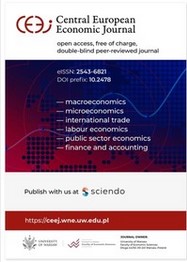Equilibrium and Convergence in Income Distribution: The Case of 28 European Countries in the Recent, Turbulent Past (1995-2019)
Equilibrium and Convergence in Income Distribution: The Case of 28 European Countries in the Recent, Turbulent Past (1995-2019)
Author(s): Yanling Guo, Friedrich L. SellSubject(s): Economic history, Political economy, Evaluation research, Transformation Period (1990 - 2010), Present Times (2010 - today)
Published by: Wydawnictwa Uniwersytetu Warszawskiego
Keywords: inequity convergence; equilibrium; personal income distribution; redistributive policies; collective decision making;
Summary/Abstract: The authors developed a political economy equilibrium framework for personal income distribution. In the beginning, they set up a theoretical model which was rooted in status theory. With this concept, one may explain a certain or optimal degree of inequality in society and define a steady state to which inequality can converge. By taking the aggregated Gini coefficient due to a collective decision process, deviations from the steady state due to shocks are allowed. A return to equilibrium is feasible with speed which is compatible with the collective decisionmaking process. The authors then conducted an empirical analysis of personal income distribution in 28 European nations for the period before, during and after the great recession of 2009/2010 and the Euro crisis of 2010/2015 (1995–2019). Not surprisingly, they found inequality convergence in the data. However, the speed of convergence is not the same for all countries.
Journal: Central European Economic Journal
- Issue Year: 8/2021
- Issue No: 55
- Page Range: 95-125
- Page Count: 31
- Language: English

